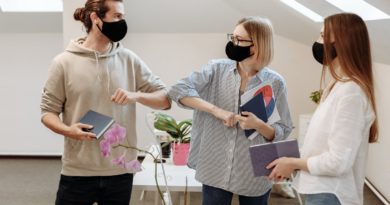Northwell Doctors Help New Yorkers Avoid Omicron
Northwell Health is currently observing how the Omicron variant of the novel coronavirus affects vaccinated and unvaccinated patients. The healthcare provider recommends adults get a COVID-19 booster shot and a flu shot and regularly get tested after socializing.
“Also continue to wear masks, socially distance, and wash hands or use hand sanitizer. Avoid hotspots, like any large gatherings of people,” Dr. Daniel Baker, medical director for Lenox Hill Hospital in New York City said.
The Omicron variant has approximately 50 mutations from the original strain, 26 of which are unique. Omicron is more resistant to the body’s immune defenses than prior variants. According to the World Health Organization, preliminary evidence indicates people who previously had COVID-19 could be easily reinfected with the Omicron variant.
Baker said that as of early December, Northwell has the capacity to care for additional patients and administer additional vaccines if needed.
“We’re doing very well at the moment. We are continuing to do elective surgeries. We’ve seen an uptick in appointments to get the booster shot, both among the general public and Northwell employees. If schools close due to the Omicron variant, that could compromise our workforce,” said Baker.
Baker said Northwell is not doing genetic testing of the entire population of COVID-19 patients. Such testing would determine which patients were infected with the Omicron variant. Northwell Labs is one of several health care companies that provide regular samples of positive tests to the New York State Department of Health to be sequenced for surveillance purposes.
“Genomic sequencing is rather arduous and difficult. Our core lab (sends) a portion of the tests (to the state) for further genetic sampling. Over time, this can tell us whether the Omicron variant becomes the predominant variant,” said Baker.
Additional research will also uncover whether the Omicron variant is more deadly than the Delta variant.
“It’s not an “apples to apples” comparison. Whole sectors of the population are vaccinated now. You can better contrast the Delta and the Omicron variants when you look at their effects on the unvaccinated population,” said Baker.
Tips for travelers and health care professionals
In late November, the U.S. instituted travel restrictions prohibiting visitors from South Africa, Botswana, Zimbabwe, Namibia, Lesotho, Eswatini, Mozambique, and Malawi from entering the country. Baker said these measures are relatively ineffective at stopping the spread of the Omicron variant.
“The restrictions just slow the spread. South Africa alone has a huge volume of travelers going through it,” said Baker.
Baker said the reason Northwell does not ask patients where they have been recently is because the novel coronavirus is less containable than other diseases like Ebola.
“When Ebola was a greater concern, hospitals used to ask patients if they had traveled to three particular countries where Ebola was prevalent. But the novel coronavirus isn’t like Ebola. It’s not helpful to ask patients where they’ve been when the virus is everywhere,” said Baker.
Baker said Northwell asks its employees who have left the country recently whether they have traveled to the eight countries in question.
Northwell’s infectious diseases group and its Clinical Advisory Group consistently reach out to individuals and healthcare facilities around the globe to learn more about the Omicron variant.
“In the early stages of the pandemic in 2020, our teams were on large conference calls with medical professionals in China and Italy. Some of the conversation focused on what we could do to help these countries. We also talked about how to handle the situation in the U.S.,” said Baker.
As New York City residents enter the winter holiday season, they can make it a regular practice to get tested for COVID.
“Continued testing is important, especially if you’re showing symptoms,” said Baker.
Baker said people should avoid panicking.
“When you’re worried, read news that helps you understand the numbers. A good example is New York State Forward, the state website with dashboards showing data about the COVID-19 variants. If you do that, you’ll see that the number of positive cases hasn’t risen to incredible levels,” said Baker.
Baker added individuals should also work to improve their mental health. They can build mindfulness by committing to one or more hobbies.
“Exercise, reading, meditation, journaling, and music help you create a completely different focus. These activities help you relax when you’re under stress,” said Baker.
In addition, New Yorkers should prepare themselves for the likelihood that variants beyond Omicron will develop.
“It’s a tough time, but stay resilient and vigilant. If you travel, get tested before you go and when you come back,” said Baker.
Baker added many college students are getting tested for the novel coronavirus on a regular basis. This is because of guidance or requirements from institutions of higher education.
“Younger people are taking part in the effort to educate and encourage the general public. We can all use PCR and rapid antigen tests to monitor ourselves for COVID,” said Baker.
A PCR test involves the amplification of genetic material from a patient’s nasal swab or saliva sample. It has a high degree of accuracy. An antigen test uses lab-made antibodies to look for antigens from the novel coronavirus in a nasal swab or saliva sample. An antigen test is less expensive but also less accurate than a PCR test.





